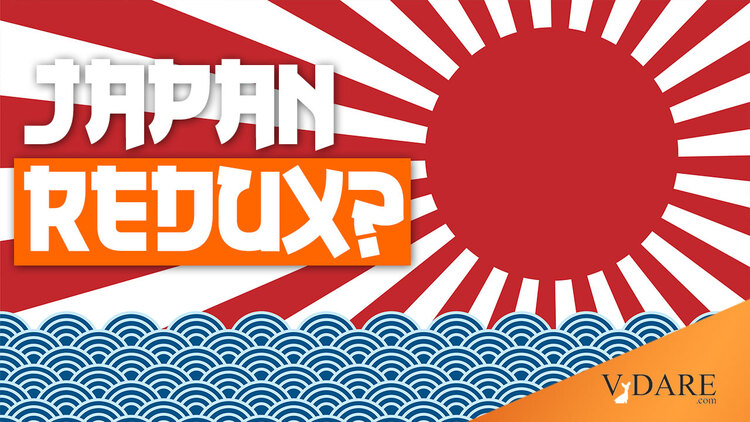
Rising Sun Redux: Japan’s Emerging Nationalism Threatens Global American Empire. Good
By Federale
04/11/2023
Earlier(2016): Japan Fighting Back Against Attempts To Make It “Nation Of Immigrants”
As Globohomo aka the Global American Empire aka the Potomac Regime’s world order crashes and burns under the weight of the Ukraine war, the Russo-China alliance, Saudi-Iranian rapprochement, and the rise of international trade in reais, rubles, rupees, and renminbi, it faces another big problem: Japanese nationalism, similar to that of the 1930s, is rising openly, after rising discreetly for some years. It’s yet another direct threat to the neoliberal and neocon warmongering that appears to be the Biden Regime’s foreign policy.
Since defeat in World War II, Japan’s nationalism — defined as pride in and attachment to the nation-state — was intentionally suppressed by the country’s political leadership. Japanese people got the message: keep nationalist feelings in your heart… for the time being. It was understandable. Nothing like total defeat after nuclear devastation to bring out the Japanese adage: The nail that stands up gets hammered down. (That might not be a real Japanese adage, by the way: in Japanese carpentry, joinery is the accepted way to build with wood. Nails are seen as un-Japanese and hence to be avoided if possible.)
Still, Japan remained intensely ethnocentric. The feelings of the Japanese for their nation were still there, waiting for the appropriate time to express themselves.
This continued throughout the Occupation (1945-1952) and the era of American domination. That was acceptable then; Japan exchanged nationalism and militarism for domestic peace, protection under the American nuclear umbrella, the building of an export economy via mercantilism, and the building of public infrastructure with money saved because American taxpayers provided Japan’s national defense. It was a good deal for Japan, but one that could not last. Japan is now telling the world — through big business, arts, literature, and entertainment, and sports and other means — that Japan is back. It has returned to nationalism combined with ethnocentrism.
Indeed, Japan has always planned to reassert itself on the world stage. It merely “endured the unendurable,” as commanded by its Emperor, for a period, until the political tides changed [Japan releases Emperor Hirohito’s war-ending speech as 70th anniversary nears, by the Associated Press, August 1, 2015].
And change those tides did. Starting in 1989, with the book The Japan That Can Say No, Sony founder and Chairman Akio Morita and Shintaro Ishihara, a Liberal Democratic Party leader, advised the world that Japan would no longer accept ”unequal treaties.” As the multi-polar order arises out of the ashes of Neo-Liberalism, Japan is putting the world on notice — again, even if discreetly so — that it will again become a world power, one independent from the American or Chinese orbits [Japan Must Have Nukes To Protect Itself From The Alliance Of Globohomo And Red China, Federale, March 2, 2023].
Consider the recently deceased actor and composer Ryuichi Sakamoto, most famous for his portrayal of Captain Yonoi in the 1983 movie Merry Christmas Mr. Lawrence, in which he played the paradigm of the 1930s Japanese junior officer — the men most responsible for the Japanese war policy of nationalism and militarism. His recent death resulted in an outpouring of sentiment among all generations of Japanese. His image from the movie was all over Japanese television [Famed Japanese musician Ryuichi Sakamoto mourned across the world, Kyodo News, April 3, 2023].

The Quintessential Japanese Officer
The domestic reaction to Sakamoto’s death shows that nationalism and militarism are not as discredited as once thought. Now Japan is free to be Japanese and proud of it, and back it up with bayonets and, perhaps, nuclear weapons.
But images of stern Japanese officers were not the only militaristic aspects of recent events in Japan. The renewed militaristic image of Japan extends to their recent victory in the World Baseball Classic, where the Japanese team, known as Samurai Japan, beat the United States [Ohtani Shines as Japan Beats U.S. to Win World Baseball Classic, by James Wagner, New York Times, March 22, 2023].
The Japanese were also intensely proud of the performance of their World Cup soccer team, Samurai Blue, and the superior off-the-pitch behavior of the team and fans.
Japan bids the World Cup farewell after its World Cup last-16 penalty shootout defeat by Croatia on Monday, but the team and its fans left lasting memories that won the Asian nation plenty of plaudits in Qatar and across the watching world. …
After the win over Germany, Japan’s players cleaned up their dressing room, leaving it looking immaculate. A thank you note in Arabic and Japanese was also left on the table, according to Reuters. …
While the Samurai Blue brought drama, debate and courtesy, Japanese fans were also busy playing their part in creating good vibes at Qatar 2022.
After watching their team play in those World Cup games, the Japanese contingent mirrored their team’s efforts in the dressing room against Germany and worked together to clean up their rubbish in the stands. …
[Japan Wins Plaudits For World Cup Shocks And Fans Cleaning Up In Stadiums, By John Sinnott, CNN, December 5, 2022. Emphasis added]
Add to this the wild admiration for the leader of Samurai Japan, Shohei Ohtani, an athlete who shows that the samurai spirit, Bushido, still lives in the hearts of the Japanese even if only expressed now in sports or superior public morals.

Bushido And Baseball, Nationalism Is Expressed By Sports Leader Shohei Ohtani
Speaking of public morals, while radical homosexuals and “transgenders” destroy America from within, using public spaces like schools and libraries to groom American kids, the Japanese read to their children, like normal people once did in America:
A picture book reading event took place on March 25 to promote family-friendly spaces inside train cars on all four lines of the Toei Subway system, which allow parents to leave strollers there without folding them.
Tokyo’s Toei Subway shows off family-friendly spaces inside trains at picture book eventhttps://t.co/BMXniRGPLY
— The Mainichi (Japan Daily News) (@themainichi) March 27, 2023A total of 47 individuals from 22 families participated in the event, which was divided into morning and afternoon sessions and held inside an Asakusa Line Type 5500 railcar at the Magome train depot of the Tokyo Metropolitan Government’s Bureau of Transportation.
The family-friendly spaces in the railcars can be spotted easily as their walls are decorated with popular characters, such as Thomas the Tank Engine, and Miffy and Dan. During the event, children listened to the stories of “Darumachan to Tenguchan” (”Little Daruma and Little Tengu”) and “Gurunpa no yochien” (”Grumpa’s kindergarten”) while surrounded by their favorite characters. Some families took photos after the picture book reading.
[Tokyo’s Toei Subway Shows Off Family-Friendly Spaces Inside Trains At Picture Book Event, Mainichi, March 27, 2023]
In other words, family-friendly reading to children in Japan means just that. It doesn’t mean allowing perverts dressed as prostitutes to recruit and groom children for molestation and sexual mutilation.
Japanese nationalism and militarism is a rejection of modern perversity dressed up as democracy. The militarists of the 1930s knew that exposure to Western decadence threatened Japan. Indeed, looking back at them, it’s almost as if they had a crystal ball, and saw the future and what America would become and spread across the globe. Their only failure was defeat.
But the Japanese have always known they eventually must return to the most basic functions of a nation-state, protecting the Japanese nation and their national territory from predators like China and Globohomo. Only a strong national defense and strong government can do that.
Japan’s political elites are leading the return of nationalism. Late Prime Minister Abe Shinzo was at its center to his dying day. His goal: eliminate the MacArthur Constitution and return to a strong, independent Japan like that in the 1930s, one that can say no and act in its own interests.
The era of a quiet Japan is over. Its response to the Globohomo is this: Banzai! And Revere The Emperor, Expel The Barbarian!
The blogger Federale is a 4th generation Californian and a veteran of federal law enforcement, including service in the legacy Immigration and Naturalization Service, the Department of Homeland Security, and other federal law enforcement agencies.
